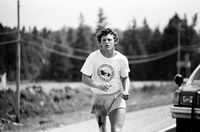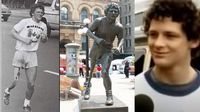On April 12, 1980, a young man named Terry Fox dipped his artificial leg into the Atlantic Ocean in St. John’s, Newfoundland, marking the start of his historic Marathon of Hope. This year, as Canada reflects on the 45th anniversary of this monumental event, the legacy of Fox continues to inspire a nation and has significantly impacted cancer research.
Dr. André Veillette, an oncologist who watched Fox’s journey unfold during his medical school years, recalls the profound effect that Fox had on him personally and on public awareness regarding cancer. "I didn’t realize the impact the 21-year-old, just a year older than I was at the time, would have on my life," said Veillette. He went on to become the director of a molecular oncology research unit in Montreal and the executive director of the Marathon of Hope Cancer Centres Network, which is dedicated to advancing cancer research.
Reflecting on Fox's legacy, Veillette noted that it took years for breakthroughs in cancer treatment to emerge. He emphasized the importance of sustained efforts in cancer research, likening it to a marathon rather than a sprint. "A sustained effort, a marathon, is actually needed to really get to the end of this," he stated.
Fox's journey was not just about running; it was about raising awareness and funds for cancer research. By 1981, he had raised approximately $24 million, and since then, the Terry Fox Foundation has raised over $950 million, funding more than 1,300 cancer research projects. This week, the foundation launched a cancer breakthrough fund in partnership with a venture capital firm aimed at connecting startups developing cancer therapies with investors.
Fred Fox, Terry's older brother, has dedicated his life to preserving Terry's legacy. He visits over 100 schools each year to share his brother's story and promote the importance of cancer research. "I think it's because Terry never gets older. But he's still a 21, 22-year-old kid that was running across Canada that I think young students and children across the country can relate to," Fred Fox explained.
Terry Fox was diagnosed with osteogenic sarcoma at the age of 18, leading to the amputation of his right leg. His experiences during 16 months of chemotherapy opened his eyes to the struggles faced by cancer patients. "Seeing so many others, younger and older, going through the same things... learning that they've passed away, it impacted Terry like nothing else had ever impacted him," Fred Fox said.
As an oncologist in the 1990s, Veillette witnessed the limited treatment options available to patients and decided to pivot from patient care to cancer research. He highlighted two major advancements that have revolutionized the field. The first was the discovery of the first human oncogene in the early '80s, which shifted the understanding of tumor development. The second was the realization that the immune systems of cancer patients were often failing them, allowing tumors to grow unchecked.
Veillette noted, "This is when we started to identify ways to affect the genes that are mutated in cancer so that we can treat people, ways that we can wake up the immune system." Immunotherapy, which aims to boost a cancer patient’s immune response, has become a cornerstone of modern cancer treatment. However, Veillette cautioned that there is still a long way to go in refining cancer diagnosis and treatment.
On April 12, 2025, Fred Fox retraced his brother's first steps by running from Mile 0 to city hall in St. John's, a symbolic gesture that commemorated the start of Terry's journey. St. John's Mayor Danny Breen honored him by placing the Chain of Office around his neck, replicating the honor given to Terry Fox in 1980. Fred Fox expressed pride in how his brother's efforts have led to significant advancements in cancer treatment, stating, "People are surviving a cancer diagnosis because of what Terry started here 45 years ago. Finding a cure for cancer is getting closer every day."
The annual community run hosted by the Terry Fox Foundation is set to take place on September 14, 2025, with registration opening on April 12, 2025. This event continues to unite communities across Canada in the fight against cancer, reminding people of the importance of fundraising and awareness.
As Fred Fox reflected on the legacy of his brother, he acknowledged the profound impact that Terry Fox has had on Canadian society. "He could never have imagined what those words would mean, all these years later," he said, recalling Terry's diary entry on the day he began his marathon. The Marathon of Hope has not only raised millions for cancer research but has also inspired countless individuals to contribute to the fight against cancer.
In the years since Terry Fox's run, the Terry Fox Foundation has become a leading force in cancer research, supporting innovative projects and fostering collaboration among Canadian researchers. Sherri Christian, a biochemistry professor at Memorial University, leads the Marathon of Hope Cancer Centres Network, which focuses on precision medicine for cancer treatment. "Precision medicine is making sure that the patient gets exactly the right treatment at exactly the right time for their particular cancer," she explained.
Christian emphasized the critical role fundraising plays in advancing cancer research. "Research can be hard. It doesn't always go the way you want it to. To see the people who are fundraising, the people who are affected by cancer, all in the same room is really motivating," she said.
As Canada commemorates the 45th anniversary of Terry Fox's Marathon of Hope, the nation continues to honor his legacy through ongoing efforts to improve cancer treatment and support those affected by the disease. The spirit of Terry Fox lives on, inspiring new generations to join the fight against cancer.






